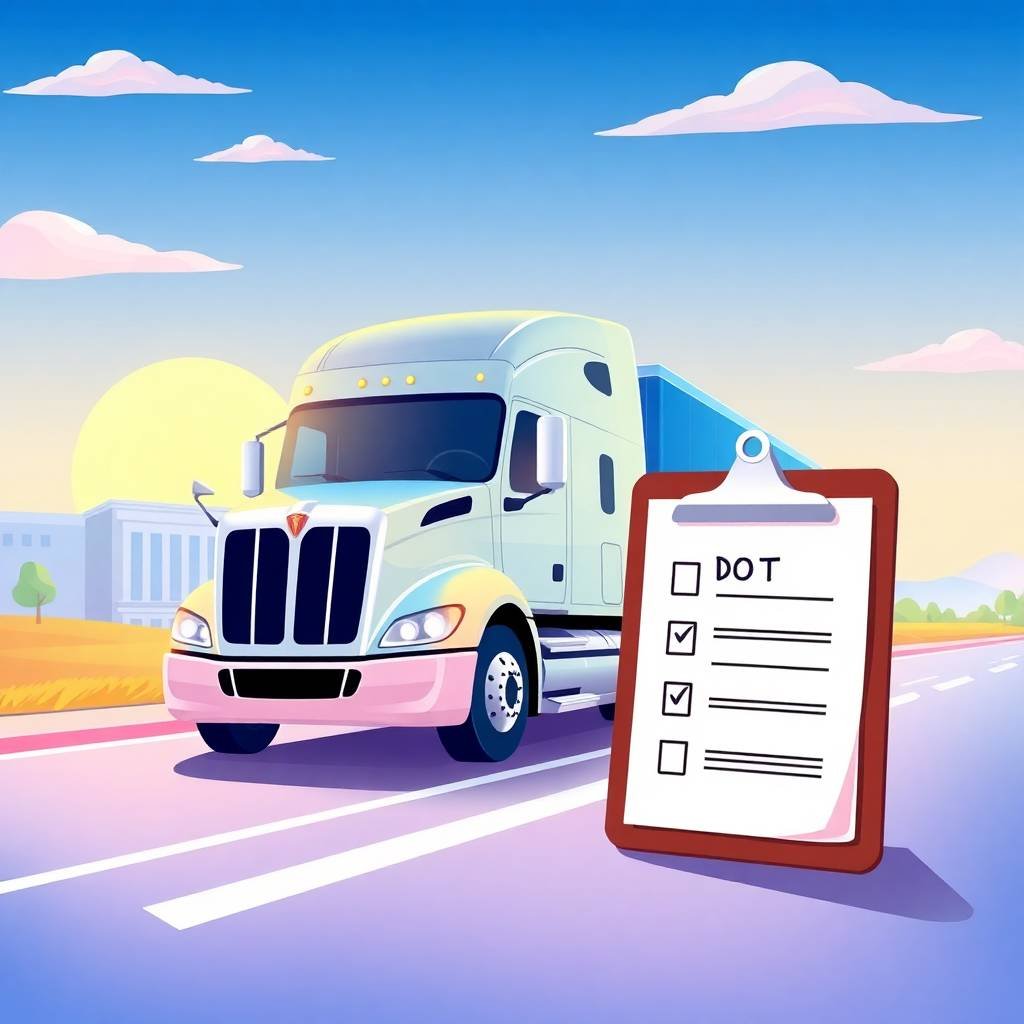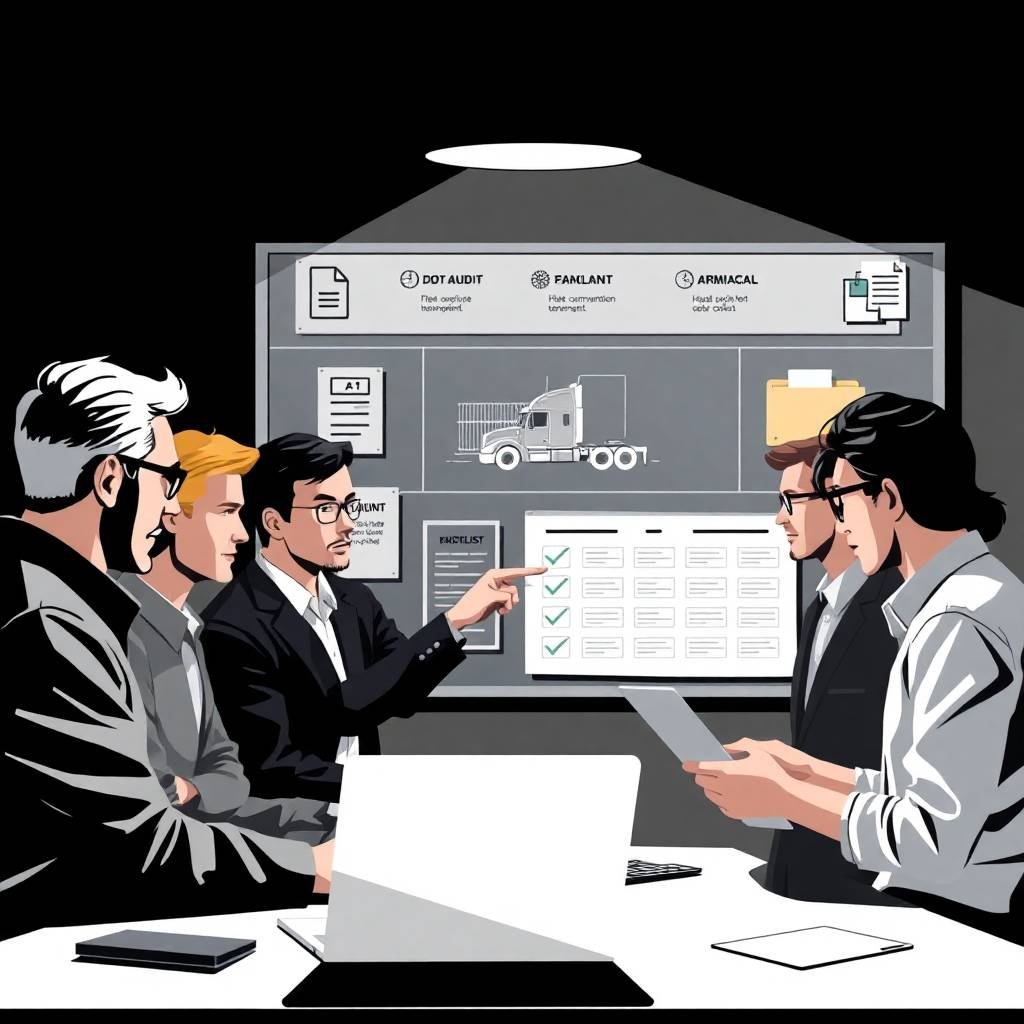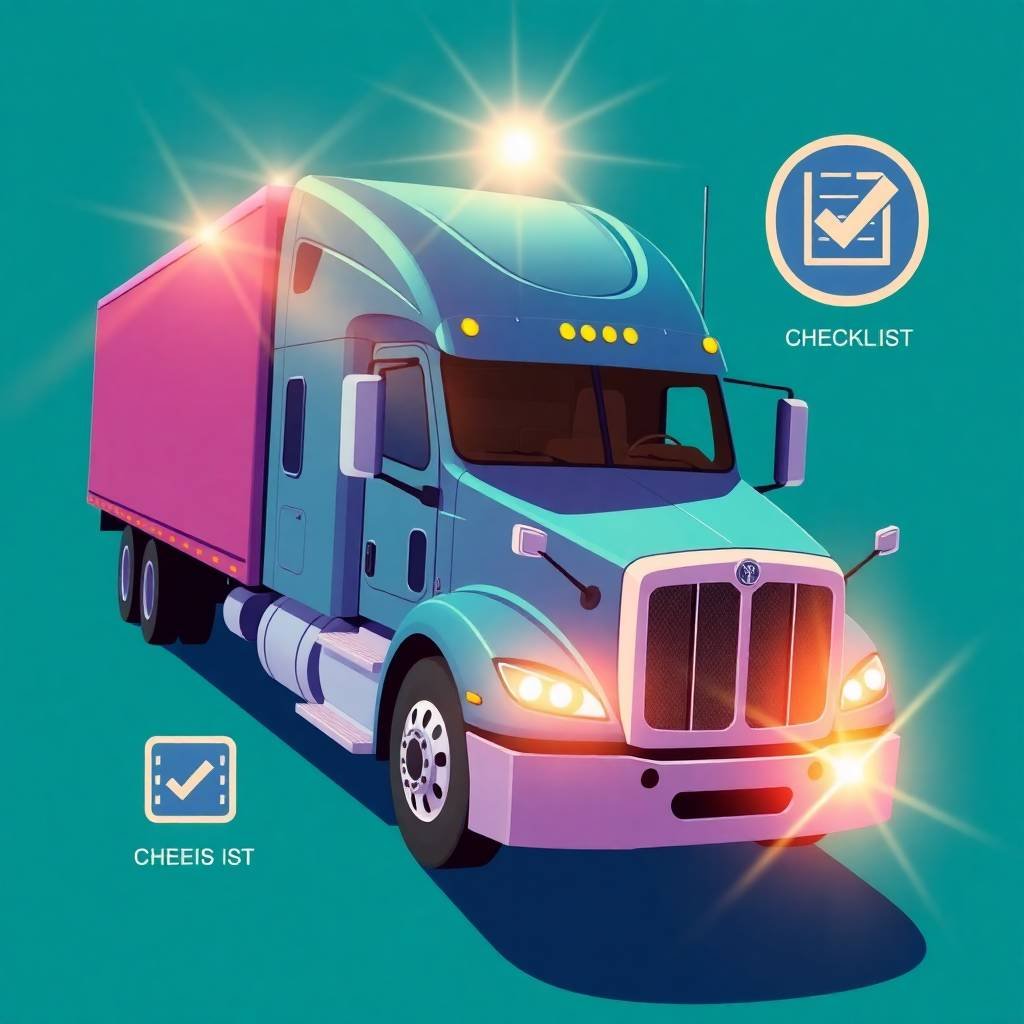1. Understanding DOT Compliance: What Trucking Companies Must Know First
For any transportation business, staying compliant with federal regulations is not just a matter of good practice—it’s a legal necessity. DOT compliance ensures safety, accountability, and operational legitimacy. Before diving into the details of the DOT Compliance Checklist for Trucking Companies, it’s crucial to understand what DOT compliance truly entails and how it impacts your fleet, drivers, and business reputation.
What Is DOT Compliance?
DOT compliance refers to the set of rules and regulations established by the U.S. Department of Transportation (DOT) and enforced through agencies like the Federal Motor Carrier Safety Administration (FMCSA). These regulations are designed to ensure the safety of commercial motor vehicles (CMVs), drivers, and the public. For a detailed overview of federal standards, visit transportation.gov or the FMCSA official site.
Trucking companies are expected to maintain specific records, train their staff, and keep their vehicles in safe operating condition. The DOT Compliance Checklist for Trucking Companies acts as a framework to stay on top of these obligations.
Core Components of DOT Compliance
Driver Qualification Files (DQFs)
Maintaining proper driver qualification files is one of the first steps on the DOT Compliance Checklist for Trucking Companies. These files must include a valid CDL, employment history, medical certifications, and safety performance records. For ongoing monitoring support, refer to our DQ File Setup and Monitoring service.
Hours of Service (HOS) & ELD Requirements
Proper tracking of driver hours is federally mandated to prevent fatigue-related accidents. All trucking companies must use Electronic Logging Devices (ELDs) and maintain accurate records of duty status. Violations can trigger a DOT audit, which you can prepare for using our DOT Audit Preparation Guide.
Drug and Alcohol Testing Compliance
A critical aspect of any DOT Compliance Checklist for Trucking Companies is managing a compliant drug and alcohol testing program. This includes pre-employment, random, and post-accident testing. Learn more about implementing and managing your program through our Drug and Alcohol Testing Management support page.
Licensing, Permits, and Filings
Fleet operators must also ensure timely completion of licensing requirements such as UCR, IFTA, IRP, and BOC-3 filings. These compliance elements are non-negotiable for avoiding costly fines. Our IFTA, IRP & BOC-3 Support Services and UCR Filing Assistance can help streamline the process.
Why Staying Compliant Matters More Than Ever
With the government’s increasing focus on transportation safety—as highlighted in recent policy updates on the White House website—compliance is under more scrutiny. A solid DOT Compliance Checklist for Trucking Companies helps prevent disruptions, failed audits, and reputational damage.
Ready to Take the Next Step?
Avoid costly mistakes by working with experts who understand compliance inside and out. To get personalized help, schedule your appointment today.
For more industry updates and compliance strategies, explore our latest content at Truckers Compliance Hub.

2. DOT Compliance Checklist for Trucking Companies: Your Legal Safety Net
For trucking companies, compliance is more than just paperwork—it’s a legal safety net that shields your business from costly violations, audit failures, and potential shutdowns. The DOT Compliance Checklist for Trucking Companies is a foundational tool that ensures your operations meet the rigorous standards set by federal regulations.
Failing to comply with the U.S. Department of Transportation (DOT) can result in severe penalties, damaged reputation, and legal challenges. That’s why every carrier should understand how this checklist functions as a protective framework.
Why the DOT Compliance Checklist Matters
The DOT Compliance Checklist for Trucking Companies outlines everything carriers must monitor and maintain to remain compliant with federal safety regulations. The Federal Motor Carrier Safety Administration (FMCSA) enforces these regulations, and non-compliance can quickly escalate into significant operational and financial setbacks. For up-to-date government transportation policies, refer to transportation.gov and the FMCSA website.
This checklist not only helps avoid enforcement actions but also builds a culture of safety and accountability within your company. With recent policy shifts emphasizing infrastructure and transportation reform—as highlighted on the White House’s official website—staying proactive is more important than ever.
Key Areas to Include in Your Checklist
Driver Qualification Files (DQFs)
A core element of the DOT Compliance Checklist for Trucking Companies is maintaining current and complete driver qualification files. These include background checks, medical certifications, and driving records. Our DQ File Setup and Monitoring service helps carriers manage this crucial requirement efficiently.
Drug and Alcohol Testing Programs
FMCSA regulations mandate strict drug and alcohol testing protocols. Pre-employment, random, post-accident, and return-to-duty testing must all be properly documented. Ensure your program meets federal standards with support from our Drug and Alcohol Testing Management team.
Compliance with UCR, IFTA, IRP & BOC-3 Filings
Many trucking companies struggle with recurring filings and renewals. Timely submission of Unified Carrier Registration (UCR), International Fuel Tax Agreement (IFTA), International Registration Plan (IRP), and BOC-3 paperwork is essential. You can streamline this process using our UCR Filing Assistance and IFTA, IRP & BOC-3 Support.
DOT Audit Preparation
No company wants to be caught off guard by a compliance audit. Our detailed DOT Audit Preparation Guide can help you stay ahead of any inspection and avoid penalties by being fully prepared.
Stay Compliant and Confident
Using a comprehensive DOT Compliance Checklist for Trucking Companies keeps your business aligned with FMCSA expectations and minimizes risk. It’s not just a checklist—it’s a safeguard for your reputation and long-term profitability.
For personalized compliance support, schedule your appointment today. And to stay current on regulatory changes, visit our resource hub at Truckers Compliance Hub.

3. Driver Qualification Files: A Non-Negotiable Step to Compliance
One of the most critical—and often overlooked—components of the DOT Compliance Checklist for Trucking Companies is the proper creation and maintenance of Driver Qualification Files (DQFs). These records are not just paperwork; they are federally mandated documentation that prove your drivers meet all safety and legal requirements set by the Federal Motor Carrier Safety Administration (FMCSA).
Neglecting this area can lead to severe consequences, including failed audits, costly fines, and even being placed out of service. In today’s highly regulated transportation environment, understanding and maintaining DQFs is a non-negotiable part of staying compliant.
What Are Driver Qualification Files?
Driver Qualification Files are detailed personnel files required for each commercial motor vehicle (CMV) driver. They serve as evidence that your drivers are legally qualified to operate commercial vehicles under DOT regulations. According to the FMCSA and guidelines listed on transportation.gov, these files must include:
- A completed employment application
- Copies of the driver’s commercial driver’s license (CDL)
- Medical examiner’s certificate
- Motor vehicle records (MVR) from the past three years
- Verification of previous employment
- Annual reviews and certifications of violations
For the latest on regulatory updates affecting DQFs and other compliance topics, visit Truckers Compliance Hub.
Why DQFs Are Essential to Your Compliance Strategy
The DOT Compliance Checklist for Trucking Companies is built on the foundation of strong recordkeeping and oversight. DQFs are among the first items reviewed during a DOT audit, and missing or outdated information can result in immediate citations. To help you stay ahead of inspections, explore our comprehensive DOT Audit Preparation guide.
Managing DQFs Efficiently
Keeping DQFs updated can be time-consuming, especially for fleets with a large number of drivers. Errors or delays in updating documents can lead to non-compliance. Our DQ File Setup and Monitoring service helps carriers ensure all required documents are accurate, current, and easily accessible.
Additionally, proper management of DQFs complements other compliance tasks such as drug and alcohol testing, UCR filings, and maintaining IFTA, IRP, and BOC-3 filings.
Regulatory Pressures Are Increasing
With the federal government’s growing focus on transportation safety—outlined on platforms like the White House website—trucking companies must take a proactive approach to compliance. The DOT Compliance Checklist for Trucking Companies is no longer optional; it’s a vital business asset.
Secure Your Compliance Today
Building and maintaining compliant Driver Qualification Files is one of the best ways to protect your business from regulatory risk. Make sure your team is fully prepared by following every step of the DOT Compliance Checklist for Trucking Companies.
Need help getting started? Schedule your appointment today for a personalized compliance consultation and keep your fleet on the road safely and legally.
4. Hours of Service (HOS) Rules: Staying on the Right Side of the Law
In the commercial trucking industry, understanding and following Hours of Service (HOS) rules is not just about avoiding violations—it’s about protecting lives, property, and your business. As a critical component of the DOT Compliance Checklist for Trucking Companies, HOS regulations are strictly enforced by the Federal Motor Carrier Safety Administration (FMCSA) and serve as a frontline defense against fatigue-related accidents.
Failure to comply with HOS rules can lead to audit failures, hefty fines, and a tarnished safety score, all of which can damage your business. The first step to staying compliant is understanding what’s required and how to implement HOS rules effectively.
What Are Hours of Service (HOS) Regulations?
HOS rules regulate the number of hours a commercial driver can operate a vehicle before needing a rest. These rules are designed to ensure that drivers are well-rested and alert on the road. For a full breakdown of current HOS rules, visit the FMCSA’s official website.
Here’s a quick overview:
- Drivers may drive a maximum of 11 hours after 10 consecutive hours off duty.
- A driver cannot drive beyond the 14th consecutive hour after coming on duty.
- 30-minute rest breaks are required after 8 hours of driving.
- Drivers may not exceed 60/70 hours on duty in 7/8 consecutive days.
Why HOS Compliance Matters for Your Business
HOS compliance is a cornerstone of the DOT Compliance Checklist for Trucking Companies. It directly impacts your CSA (Compliance, Safety, Accountability) scores and plays a significant role in DOT audits. A violation can lead to roadside shutdowns or long-term consequences such as increased insurance premiums.
To stay prepared, explore our DOT Audit Preparation guide for step-by-step strategies to manage HOS data during inspections.
Electronic Logging Devices (ELDs) and Recordkeeping
Federal law mandates the use of Electronic Logging Devices (ELDs) for most commercial drivers. These devices automatically track driving time and hours, reducing paperwork and increasing transparency. ELDs are essential for meeting HOS standards and are a recommended part of the DOT Compliance Checklist for Trucking Companies.
To ensure your drivers are fully documented, we also offer DQ File Setup and Monitoring, which helps centralize all driver records in one compliant system.
Staying Ahead of Regulatory Changes
Government agencies such as the U.S. Department of Transportation and the White House continuously evaluate safety regulations, meaning your compliance practices must evolve too. Stay current by visiting Truckers Compliance Hub for up-to-date articles and insights.
Additionally, remember that other compliance areas—like Drug and Alcohol Testing Management, UCR Filings, and IFTA/IRP/BOC-3 Support—are interconnected with HOS tracking and impact your overall DOT readiness.
Take Control of Your HOS Compliance
Implementing HOS rules correctly is one of the best ways to stay compliant and avoid unnecessary risk. Treat it as a non-negotiable item on your DOT Compliance Checklist for Trucking Companies.
Need expert guidance? Schedule your appointment today to learn how to safeguard your operations from avoidable HOS violations.

5. Vehicle Maintenance Records: Prove It or Risk Fines
Maintaining a safe, compliant fleet isn’t optional—it’s required by law. One of the most overlooked yet essential parts of the DOT Compliance Checklist for Trucking Companies is keeping accurate and up-to-date vehicle maintenance records. Without this documentation, trucking companies open themselves up to hefty fines, failed audits, and potential operational shutdowns.
From routine inspections to scheduled repairs, every maintenance activity must be logged properly. Not only does this protect drivers and equipment, but it also serves as a legal safeguard if your company is ever audited or investigated.
Why Vehicle Maintenance Records Matter
Under regulations set forth by the Federal Motor Carrier Safety Administration (FMCSA), commercial carriers must maintain detailed records for each vehicle under their control for 30 days or more. These documents prove that your fleet is roadworthy and compliant with safety regulations.
For a complete list of federal standards, visit the FMCSA website or browse the general transportation guidelines at transportation.gov. Compliance in this area is not only about safety—it’s about documentation. If you can’t prove it, it’s as if it never happened.
What Should Be Included?
To meet the standards of the DOT Compliance Checklist for Trucking Companies, vehicle maintenance records should include:
- Identification of each vehicle, including VIN, make, model, and year
- Scheduled maintenance plans and intervals
- Records of inspections, repairs, and parts replacements
- Evidence of annual inspections
- Driver vehicle inspection reports (DVIRs)
Carriers who lack these documents during a DOT audit risk immediate penalties. Learn how to prepare effectively with our DOT Audit Preparation Guide.
Digital Tracking and Centralization
Gone are the days when paper records were sufficient. Today, digital tracking systems offer a secure and efficient way to centralize vehicle records. These systems make it easier to stay compliant with the DOT Compliance Checklist for Trucking Companies and help avoid last-minute scrambles during audits.
Centralized documentation also supports other aspects of compliance like DQ file monitoring and drug and alcohol testing management, making your entire operation more streamlined.
Stay Ahead of Regulation Changes
The current federal administration continues to emphasize transportation safety and infrastructure reform, as highlighted on the White House website. Regulatory updates can happen quickly, so staying informed is key. Follow the latest posts on Truckers Compliance Hub for ongoing guidance.
Don’t forget that maintenance records intersect with other regulatory areas like UCR Filing and IFTA, IRP, and BOC-3 documentation, all of which form the foundation of a solid compliance strategy.
Don’t Risk It—Prove It
If your maintenance records aren’t complete, you’re not compliant. It’s that simple. Fines and shutdowns are avoidable when your business is prepared. Treat vehicle documentation as a core element of your DOT Compliance Checklist for Trucking Companies.
Want expert help getting organized? Schedule your appointment today to review your maintenance program and ensure your fleet is both safe and compliant.

6. Drug and Alcohol Testing Programs: Keeping Roads and Reputations Safe
For every trucking company, safety on the road begins with responsible drivers. That’s why drug and alcohol testing programs are a non-negotiable part of the DOT Compliance Checklist for Trucking Companies. These programs are essential not just for legal compliance but for preserving public trust, employee well-being, and company reputation.
The Federal Motor Carrier Safety Administration (FMCSA) mandates strict drug and alcohol testing protocols to ensure that all commercial drivers meet safety standards. Non-compliance can lead to severe penalties, including fines, license suspension, or even business closure. But beyond enforcement, a strong testing program builds a culture of accountability and safety.
Why Drug and Alcohol Testing Is Mandatory
Every trucking company regulated by the Department of Transportation (DOT) must have a drug and alcohol testing policy in place. This requirement applies to drivers operating commercial motor vehicles requiring a CDL. The rules are detailed on the FMCSA website and further supported by federal policies from the Department of Transportation and White House.
The DOT requires testing at multiple stages:
- Pre-employment testing before allowing a driver to operate a CMV
- Random testing throughout the year
- Post-accident testing after qualifying incidents
- Reasonable suspicion testing based on observable behavior
- Return-to-duty and follow-up testing after policy violations
A comprehensive testing program is one of the pillars of the DOT Compliance Checklist for Trucking Companies, and it directly affects your company’s audit readiness.
Implementing an Effective Program
A successful program starts with policy clarity, proper recordkeeping, and a trusted third-party administrator. Trucking companies often struggle with managing testing deadlines, record documentation, and FMCSA reporting requirements. Our Drug and Alcohol Testing Management service ensures your program is complete, accurate, and always compliant.
This program should work hand-in-hand with other compliance tasks like DQ File Monitoring and DOT Audit Preparation to create a seamless system that meets federal standards.
The Cost of Non-Compliance
Failing to comply with drug and alcohol testing requirements puts your company at risk. Violations can lead to:
- DOT audit failures
- Financial penalties
- Lawsuits in the event of drug-related accidents
- Permanent damage to your reputation
Don’t let a preventable error ruin your operation. Explore the full scope of your responsibilities on Truckers Compliance Hub, where you’ll also find resources for UCR Filing Assistance and IFTA/IRP/BOC-3 Support.
Stay Ahead with Expert Guidance
The regulations are complex, but compliance doesn’t have to be overwhelming. Our team helps trucking businesses develop and manage robust testing programs that align with every item on the DOT Compliance Checklist for Trucking Companies.
Need help getting started or improving your current program? Schedule your appointment today and gain expert insights tailored to your fleet.
7. Electronic Logging Devices (ELDs): A Must for Modern Trucking Fleets
In today’s highly regulated transportation landscape, Electronic Logging Devices (ELDs) are no longer optional—they are a legal requirement and a critical part of the DOT Compliance Checklist for Trucking Companies. These devices do more than track hours of service (HOS); they are vital tools that ensure your fleet remains compliant, efficient, and audit-ready.
Failing to comply with ELD regulations can lead to costly penalties, reduced operational capacity, and a damaged safety record. That’s why every modern fleet must integrate ELDs into its broader compliance strategy.
What Are ELDs and Why Are They Required?
ELDs automatically record a driver’s HOS, replacing traditional paper logs. This change was mandated by the Federal Motor Carrier Safety Administration (FMCSA) to reduce fatigue-related accidents and improve road safety. The official ruling and full compliance requirements can be found on the FMCSA website.
Including ELD integration in your DOT Compliance Checklist for Trucking Companies ensures your operation stays in step with federal mandates. The policy is further supported by national transportation priorities outlined on Transportation.gov and endorsed by broader infrastructure initiatives at the White House.
ELDs and the DOT Compliance Checklist
ELDs touch multiple aspects of your compliance program, including:
- Accurate HOS tracking to avoid violations
- Real-time GPS and engine data, which supports safety monitoring
- Streamlined roadside inspections and audit readiness
- Driver accountability and improved operational planning
As part of the DOT Compliance Checklist for Trucking Companies, ELDs also complement efforts in areas like DQ file monitoring and drug and alcohol testing management, helping to create a holistic and data-driven compliance program.
Preparing for ELD-Related DOT Audits
If your logs are incomplete, improperly managed, or show signs of tampering, you risk non-compliance. Make sure your fleet is audit-ready by leveraging DOT Audit Preparation resources that are aligned with ELD requirements. Inspectors look for consistency, data retention, and accuracy—three areas where ELDs excel when used correctly.
Keeping accurate digital logs also ties into requirements for UCR filings and IFTA, IRP, and BOC-3 filings, all of which are key parts of the DOT Compliance Checklist for Trucking Companies.
A Smart Investment for the Long Haul
Though some smaller carriers initially saw ELDs as a burden, many now recognize their value in boosting efficiency, reducing risk, and streamlining compliance. Centralizing data with ELDs also makes it easier to integrate updates from resources like Truckers Compliance Hub, where industry best practices are shared frequently.
Modern trucking fleets that embrace ELDs are setting the standard for compliance and accountability—two traits that are essential for long-term success.
Get the Help You Need
Navigating ELD requirements and the broader DOT Compliance Checklist for Trucking Companies can be complex. If you need help selecting the right devices, configuring them, or training your drivers, schedule your appointment today for expert guidance.

8. Accident Register & Reporting: Be Ready Before It Happens
In the trucking industry, accidents are never planned—but preparedness is. A well-maintained accident register and reporting process is a required component of the DOT Compliance Checklist for Trucking Companies, ensuring your business can respond effectively when incidents occur.
The Federal Motor Carrier Safety Administration (FMCSA) mandates that all motor carriers involved in interstate commerce must maintain an accident register for at least three years. This register is essential not just for regulatory compliance but for internal safety analysis and audit readiness. A lack of documentation or improper reporting could result in hefty fines and damage to your company’s reputation.
Why Accident Reporting Matters
Accidents—regardless of fault—trigger an immediate compliance obligation. According to the FMCSA, trucking companies must log specific details about each reportable crash. This includes the date, location, driver’s name, number of injuries or fatalities, hazardous material spills, and vehicle damage.
As a core requirement in the DOT Compliance Checklist for Trucking Companies, proper accident documentation demonstrates your commitment to safety and accountability. Regulations from the Department of Transportation and initiatives supported by the White House reinforce the role of reporting in national roadway safety strategies.
What Must Be Included in Your Accident Register?
An accurate accident register must detail:
- The date and location of each accident
- The driver’s name
- Number of injuries and fatalities
- Whether hazardous materials were released
- Copies of all related reports and insurance documentation
Companies must also be prepared to show this information during compliance reviews. That’s why incorporating accident registers into your ongoing DOT Audit Preparation plan is crucial.
Integrating Reporting into a Broader Compliance Framework
Accident reporting doesn’t exist in isolation. It connects with other key components of the DOT Compliance Checklist for Trucking Companies like Driver Qualification File management and drug and alcohol testing compliance. Accidents can trigger post-accident drug and alcohol testing protocols, so having these systems aligned ensures quick and compliant responses.
It also impacts your UCR filing status and ties into state and federal filings like IFTA, IRP, and BOC-3 requirements. These are all interconnected elements of a successful compliance strategy.
Don’t Wait for an Accident to Start Preparing
The time to think about your accident reporting protocol is before something happens. Being proactive protects not only your drivers but also your company’s long-term viability. At Truckers Compliance Hub, we provide expert guidance and ongoing support to ensure your accident register is always ready for review.
Need help building your accident documentation system or strengthening your entire compliance structure? Schedule your appointment today for one-on-one support and custom compliance solutions.
By taking accident reporting seriously, you’re not just checking off a box on the DOT Compliance Checklist for Trucking Companies—you’re building a safer, more resilient fleet.
9. Understanding CSA Scores: How Compliance Affects Your Company’s Reputation
In the competitive trucking industry, compliance is not just about avoiding penalties—it’s about protecting your company’s reputation. The CSA (Compliance, Safety, and Accountability) scores are a key metric used by the Federal Motor Carrier Safety Administration (FMCSA) to assess the safety performance of trucking companies. These scores are directly tied to your DOT Compliance Checklist for Trucking Companies, and maintaining a good CSA score can significantly impact your business.
What Are CSA Scores?
CSA scores are part of a nationwide program designed to improve road safety by monitoring the performance of motor carriers, drivers, and vehicles. These scores assess multiple safety-related factors, including:
- Hours of Service (HOS) compliance
- Vehicle maintenance
- Drug and alcohol testing
- Accident involvement
- Driver qualifications
The FMCSA uses these factors to rate your company in seven categories, and these ratings affect your safety performance and the likelihood of inspections or audits. Therefore, consistently adhering to the DOT Compliance Checklist for Trucking Companies is critical for maintaining a low CSA score.
The Link Between CSA Scores and Your Reputation
A low CSA score is an indicator of a company that prioritizes safety and compliance, while a high score suggests the opposite. A good CSA score:
- Enhances your reputation with clients and partners
- Reduces your risk of increased inspections and audits
- Lowers insurance premiums, as insurers look for companies with strong safety records
- Improves driver retention, as drivers prefer to work for reputable companies
On the other hand, a poor CSA score can result in loss of contracts, fines, and a tarnished reputation. This is why the DOT Compliance Checklist for Trucking Companies is not only a regulatory requirement but also a key to your company’s success in the marketplace.
Key Areas Affecting Your CSA Score
To ensure that your CSA score remains in good standing, focus on the following areas from the DOT Compliance Checklist for Trucking Companies:
1. Driver Qualification Files
Maintaining up-to-date driver qualification files is essential. Ensure all documentation, such as medical certifications and driving records, is in order. Regularly audit these files to prevent non-compliance. Learn more about Driver Qualification File setup and monitoring.
2. Vehicle Maintenance
Proper vehicle maintenance can prevent violations that lead to higher CSA scores. Follow regular inspection schedules and keep accurate records. A lack of maintenance could lead to violations related to unsafe equipment. Learn about IFTA, IRP, and BOC-3 support.
3. Drug and Alcohol Testing Compliance
Ensure that your company adheres to all drug and alcohol testing regulations, which are an integral part of the DOT Compliance Checklist for Trucking Companies. Non-compliance can negatively affect your CSA score. Learn about drug and alcohol testing management.
4. Accident Register & Reporting
Accurate accident reporting and maintaining an up-to-date accident register are essential to reducing CSA score penalties. Having this information ready can prevent fines and keep your reputation intact. Learn about DOT Audit Preparation.
How to Stay on Top of Compliance
Staying compliant with DOT regulations is a continuous effort. Regularly review your DOT Compliance Checklist for Trucking Companies, and ensure that your team is well-trained in safety protocols. If you’re unsure about where to start, consider scheduling a consultation to assess your compliance readiness.
Conclusion
In today’s safety-focused environment, your CSA score is a reflection of your company’s commitment to safety and regulatory compliance. Maintaining a good score is directly tied to your DOT Compliance Checklist for Trucking Companies, ensuring both legal adherence and a solid reputation in the industry. By staying compliant, you can protect your business, attract quality drivers, and secure long-term success.
For more resources and guidance on improving your DOT Compliance Checklist for Trucking Companies, visit Truckers Compliance Hub.

10. Reviewing & Updating Your DOT Compliance Checklist for Trucking Companies Annually
Keeping up with ever-evolving federal regulations is a critical responsibility for every motor carrier. Reviewing and updating your DOT Compliance Checklist for Trucking Companies annually is not just a best practice—it’s a legal and financial safeguard. Regular reviews ensure that your business operates within FMCSA guidelines and remains inspection-ready throughout the year.
Why Annual Reviews Matter
The DOT Compliance Checklist for Trucking Companies is a living document. It must evolve alongside new regulations introduced by the Federal Motor Carrier Safety Administration (FMCSA) and other federal bodies like the U.S. Department of Transportation and the White House. Non-compliance due to outdated procedures can lead to costly fines, failed audits, and reputational harm.
Annual reviews give your team a chance to identify gaps, fix inconsistencies, and implement regulatory changes that may affect your driver files, maintenance records, or operational protocols. You can stay current on industry updates by browsing new articles and guidance at Truckers Compliance Hub.
What to Review in Your DOT Compliance Checklist
1. Driver Qualification Files (DQ Files)
Your DOT Compliance Checklist for Trucking Companies must include verifying that all driver qualification files are complete, accurate, and updated. This includes ensuring valid medical certificates, driving records, and license renewals. For assistance, visit our DQ File Setup and Monitoring page.
2. Drug and Alcohol Testing Protocols
Compliance with FMCSA drug and alcohol testing regulations is non-negotiable. Review your program annually to confirm all testing procedures, consortium memberships, and random testing percentages are current. Learn more at Drug and Alcohol Testing Management.
3. DOT Audit Preparation
Annual review is the perfect time to assess your preparedness for a DOT audit. Using your DOT Compliance Checklist for Trucking Companies as a guide, simulate an audit or consult an expert. DOT Audit Preparation services can support you through the process.
4. IFTA, IRP, and BOC-3 Filings
Tax filings and interstate registration must be accurate and timely. Ensure all IFTA and IRP forms are correctly filed and your BOC-3 is active. These components are often overlooked yet critical. Our IFTA, IRP & BOC-3 Support can guide you.
5. UCR Filing Compliance
UCR filings should be reviewed every year as part of your DOT Compliance Checklist for Trucking Companies. Check that you have submitted the latest year’s filing and that your payment confirmation is documented. Visit our UCR Filing Assistance page for help.
Stay Proactive with Expert Support
To reduce risk and streamline your operations, it’s essential to partner with compliance professionals. Scheduling a consultation with an expert can give you peace of mind that your DOT Compliance Checklist for Trucking Companies is both thorough and up to date. Book your free consultation today to stay compliant and confident.
A Compliance Culture Is a Competitive Advantage
When your company makes the DOT Compliance Checklist for Trucking Companies a core part of your annual strategy, you build a culture of accountability and excellence. It not only minimizes legal risk but also strengthens your brand’s reputation across the transportation industry.
For more insights, tools, and updates to keep your compliance processes sharp, explore all our resources at Truckers Compliance Hub.
What is the DOT Compliance Checklist for Trucking Companies and why is it essential?

The DOT Compliance Checklist for Trucking Companies is a structured set of requirements established by the FMCSA to ensure commercial motor carriers operate legally and safely. This checklist covers driver qualification files, vehicle maintenance, drug testing programs, hours of service, and more. It’s essential because it helps carriers pass DOT audits and avoid penalties. For guidance on staying audit-ready, check out our DOT Audit Preparation services.
How often should trucking companies review their DOT compliance checklist?

Trucking companies should review their checklist at least annually to stay aligned with regulatory changes. More frequent reviews may be necessary if operational changes occur or new FMCSA rules are released. Our DOT Audit Preparation service can help ensure your checklist is always up to date.
What documents are required in a driver qualification file?

A compliant driver qualification file (DQF) must include the driver’s application, MVR (Motor Vehicle Record), CDL, medical examiner’s certificate, previous employment verifications, and drug testing history. Maintaining these records is one of the key steps in the DOT Compliance Checklist for Trucking Companies. Our DQ File Setup and Monitoring service ensures your documentation is complete and audit-ready.
Why is drug and alcohol testing part of the DOT compliance checklist?

Drug and alcohol testing is mandated by federal regulations to ensure public safety. The checklist includes pre-employment, random, post-accident, return-to-duty, and follow-up testing protocols. Failure to comply can lead to severe penalties. You can stay compliant with our comprehensive Drug and Alcohol Testing Management services.
How do I file my UCR and why does it matter for compliance?

The Unified Carrier Registration (UCR) is an annual requirement for interstate carriers. It verifies that a carrier has paid its share toward regulatory enforcement. Filing UCR on time is a key part of the DOT Compliance Checklist for Trucking Companies, and missing the deadline can trigger violations. We offer reliable UCR Filing Assistance to help you stay current.
What role do IFTA and IRP play in DOT compliance?

The International Fuel Tax Agreement (IFTA) and International Registration Plan (IRP) are essential for fuel tax reporting and interstate vehicle registration. Without proper filings, you risk fines and roadside enforcement issues. These components are included in the DOT Compliance Checklist for Trucking Companies. Get help managing these filings with our IFTA, IRP & BOC-3 Support service.
How often should I update my DOT compliance checklist?

The checklist should be reviewed and updated at least once a year—or more frequently if your operations change or new regulations are introduced. Regular reviews ensure your company stays aligned with FMCSA requirements. A strong DOT Compliance Checklist for Trucking Companies evolves with your business to reduce risk and liability.
What happens if I fail a DOT audit?

Failing a DOT audit can lead to serious consequences such as fines, corrective action plans, or even suspension of operating authority. Staying ahead of audit requirements is a major benefit of following a well-maintained DOT Compliance Checklist for Trucking Companies. Prepare thoroughly with our expert DOT Audit Preparation services.
Can outsourcing compliance help reduce risk?

Yes, outsourcing key compliance tasks—such as drug testing management, DQ file setup, and audit preparation—can dramatically reduce your operational risks. A well-managed DOT Compliance Checklist for Trucking Companies supported by industry professionals helps ensure nothing is overlooked. Our team provides end-to-end support to keep your fleet safe and compliant.
Igor Iturriaga is a transportation compliance expert and founder of Dynamic 305 Miami LLC. He helps owner-operators and fleets stay FMCSA-compliant and audit-ready. https://www.linkedin.com/in/igor-iturriaga-64503217/
